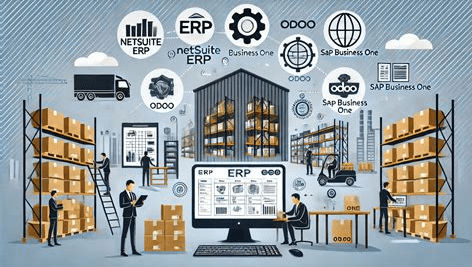Erp systems for distribution companies
Effective ERP Systems for Distribution Companies: Simplifying Operations and Improving Efficiency
Welcome to our article about Effective ERP Systems for Distribution Companies! If you are a distribution company looking to streamline your operations and boost efficiency, then you’ve come to the right place. ERP systems play a crucial role in optimizing processes, managing inventory, and enhancing customer service in the distribution industry. By implementing the right ERP system, you can simplify your day-to-day operations and improve overall business performance. Let’s explore how these systems can help your distribution company thrive in today’s competitive market.
Streamlining Inventory Management with ERP Solutions
Inventory management is a critical aspect for distribution companies, as it directly impacts their ability to meet customer demands while keeping costs in check. Manual processes for tracking inventory can be time-consuming and prone to errors, leading to discrepancies and inefficiencies in the supply chain. However, with the implementation of ERP solutions, distribution companies can streamline their inventory management processes and improve overall efficiency.
One of the key benefits of ERP systems for distribution companies is the ability to track inventory in real-time. Instead of relying on manual data entry or periodic stock checks, ERP solutions provide a centralized system that automatically updates inventory levels as goods are received, shipped, or sold. This real-time visibility into inventory levels allows companies to make informed decisions about restocking, ordering, and fulfillment, reducing the likelihood of stockouts or overstocks.
ERP systems also offer features such as demand forecasting and automated replenishment, helping distribution companies optimize their inventory levels based on historical data, sales trends, and seasonality. By accurately predicting demand and automating the reordering process, companies can reduce carrying costs and minimize the risk of excess inventory sitting idle in warehouses.
Another advantage of ERP solutions for inventory management is the integration with other business functions, such as sales, purchasing, and production. By centralizing data and processes in a single system, distribution companies can achieve better coordination and visibility across departments, leading to improved inventory accuracy and decreased lead times. For example, sales orders can automatically trigger stock allocations and shipments, while procurement activities can be synchronized with inventory levels to ensure timely restocking.
Furthermore, ERP systems enable distribution companies to implement advanced inventory control strategies, such as Just-in-Time (JIT) inventory management or vendor-managed inventory. These strategies help companies minimize holding costs, reduce lead times, and improve overall supply chain efficiency by aligning inventory levels with demand signals and optimizing order frequency and quantities.
In conclusion, ERP solutions play a crucial role in helping distribution companies streamline their inventory management processes. By providing real-time visibility, demand forecasting capabilities, integration with other business functions, and support for advanced inventory control strategies, ERP systems enable companies to optimize their inventory levels, reduce costs, and improve overall supply chain performance. Embracing ERP technology can be a game-changer for distribution companies looking to stay competitive in today’s fast-paced and dynamic market environment.
Improving Order Fulfillment Processes with ERP Systems
Order fulfillment processes are crucial for distribution companies to meet customer demands and maintain a competitive edge in the market. With the help of ERP systems, companies can streamline and optimize their order fulfillment processes to ensure timely delivery and customer satisfaction.
One of the key benefits of using ERP systems for order fulfillment is enhanced visibility and control over the entire process. By integrating different departments such as sales, inventory, and shipping into a single platform, companies can track orders in real-time and proactively address any issues that may arise. This visibility allows companies to accurately forecast demand, allocate resources effectively, and minimize delays in order processing.
ERP systems also enable companies to automate repetitive tasks and streamline workflows, reducing the risk of errors and improving efficiency. For example, with automated order processing, companies can eliminate manual data entry, reduce processing time, and minimize the likelihood of inaccuracies in order fulfillment. This not only speeds up the order fulfillment process but also reduces costs associated with manual labor and rework.
Furthermore, ERP systems provide companies with valuable insights into their order fulfillment processes through advanced reporting and analytics capabilities. By analyzing key metrics such as order cycle times, fill rates, and on-time delivery performance, companies can identify areas for improvement and make data-driven decisions to enhance their order fulfillment operations. This data-driven approach not only helps companies optimize their processes but also enables them to adapt quickly to changing market conditions and customer preferences.
Another important feature of ERP systems for order fulfillment is integration with supply chain partners and third-party logistics providers. By connecting with suppliers, carriers, and other external partners, companies can improve coordination and collaboration across the entire supply chain, resulting in faster order processing and delivery times. This integration also allows companies to track shipments in transit, communicate with partners in real-time, and proactively resolve any issues that may affect order fulfillment.
In conclusion, ERP systems play a crucial role in improving order fulfillment processes for distribution companies. By providing enhanced visibility, automation, analytics, and integration capabilities, ERP systems enable companies to streamline their operations, reduce costs, and deliver exceptional customer service. With the right ERP system in place, companies can effectively manage their order fulfillment processes and stay ahead of the competition in today’s fast-paced business environment.
Enhancing Customer Relationship Management for Distribution Companies
Customer Relationship Management (CRM) is essential for distribution companies to effectively manage interactions with customers and potential customers. By implementing an ERP system tailored for distribution companies, organizations can enhance their CRM capabilities and improve customer satisfaction.
One key feature of an ERP system that benefits CRM for distribution companies is the ability to track customer interactions and transactions in one centralized platform. This allows sales and customer service teams to have a 360-degree view of each customer, including their purchase history, preferences, and any past issues or inquiries. With this information readily available, employees can provide more personalized and efficient service, ultimately strengthening customer relationships.
Furthermore, an ERP system can automate various CRM processes, such as sending personalized emails or notifications to customers based on their buying behavior or preferences. This automation not only saves time and reduces the risk of human error but also ensures that customers receive timely and relevant communications from the company, leading to increased customer engagement and loyalty.
Another way in which an ERP system enhances CRM for distribution companies is through integrated reporting and analytics capabilities. By analyzing customer data collected through the ERP system, organizations can gain valuable insights into customer behavior, trends, and preferences. This information can then be used to develop targeted marketing campaigns, promotions, and pricing strategies that are tailored to specific customer segments, ultimately improving customer satisfaction and driving sales.
Moreover, an ERP system can facilitate seamless communication and collaboration between different departments within a distribution company, further enhancing CRM efforts. For example, sales teams can easily access real-time inventory and order information through the ERP system, allowing them to provide accurate and up-to-date product availability to customers. Additionally, customer service representatives can quickly resolve issues or inquiries by accessing relevant customer data stored in the ERP system, leading to faster response times and improved customer satisfaction.
In conclusion, by implementing an ERP system that is specifically designed for distribution companies, organizations can significantly enhance their CRM capabilities and build stronger relationships with customers. From centralized customer data tracking to automated CRM processes and integrated reporting and analytics, an ERP system offers a wide range of features that can help distribution companies improve customer satisfaction, drive sales, and ultimately achieve long-term success in a competitive market.
Boosting Supply Chain Visibility through ERP Integration
When it comes to distribution companies, having a clear and accurate view of the supply chain is crucial for managing inventory levels, improving communication with suppliers, and delivering goods to customers on time. An ERP system can play a vital role in enhancing supply chain visibility by integrating all aspects of the distribution process into a centralized platform. This integration ensures that all relevant information is captured, analyzed, and shared across departments in real-time.
One way that ERP systems boost supply chain visibility is through improved tracking and monitoring of inventory levels. By having real-time data on product stock levels, distribution companies can avoid stockouts or overstock situations, which can lead to lost sales or excess carrying costs. With an ERP system, managers can easily track inventory movements, identify trends in demand, and optimize order quantities to meet customer demands efficiently.
Furthermore, ERP systems enable distribution companies to establish better communication with suppliers and other partners in the supply chain. By integrating supplier information into the ERP system, companies can track supplier performance, monitor delivery times, and ensure that products are delivered on time. This level of transparency and collaboration helps to build strong relationships with suppliers and improve overall supply chain efficiency.
In addition to tracking inventory levels and communicating with suppliers, ERP systems also enhance supply chain visibility through data analysis and reporting capabilities. By capturing data from various sources, such as sales orders, production schedules, and shipping records, ERP systems can generate insightful reports that provide a comprehensive view of the entire distribution process. These reports can identify bottlenecks in the supply chain, highlight areas for improvement, and help managers make informed decisions to optimize operations.
Moreover, ERP systems can facilitate better decision-making by providing real-time visibility into key performance indicators (KPIs) for distribution companies. With dashboards and analytics tools, managers can monitor metrics such as order fulfillment rates, inventory turnover, and shipment accuracy, allowing them to quickly identify problems and take corrective actions. This level of visibility empowers managers to proactively manage the supply chain and respond quickly to changing market conditions.
In conclusion, ERP systems play a critical role in boosting supply chain visibility for distribution companies. By integrating all aspects of the distribution process into a centralized platform, ERP systems enable companies to track inventory levels, communicate with suppliers, analyze data, and monitor KPIs in real-time. This enhanced visibility allows distribution companies to optimize their operations, improve customer satisfaction, and stay competitive in today’s fast-paced business environment.
Optimizing Warehouse Operations with ERP Technology
Warehouse operations play a crucial role in the success of distribution companies. From inventory management to order fulfillment, efficient warehouse operations are essential for meeting customer demands and maximizing profitability. By utilizing ERP technology, distribution companies can streamline their warehouse operations and improve overall efficiency.
1. Inventory Management: ERP systems provide real-time visibility into inventory levels, locations, and movements. This enables distribution companies to accurately track stock levels, minimize stockouts, and optimize inventory replenishment processes. By automating inventory management tasks such as stock counting and replenishment, ERP technology helps reduce manual errors and ensures accurate inventory records.
2. Order Fulfillment: ERP systems help streamline order processing and fulfillment by automating order entry, picking, packing, and shipping processes. By integrating order management with inventory and warehouse management functions, distribution companies can fulfill customer orders more efficiently and accurately. This leads to faster order processing times, improved order accuracy, and higher customer satisfaction levels.
3. Warehouse Layout Optimization: ERP technology can help distribution companies optimize their warehouse layout for maximum efficiency. By analyzing data on inventory levels, order volumes, and picking patterns, ERP systems can recommend the best storage locations for products and streamline picking routes for warehouse operators. This reduces the time and effort required to locate and retrieve items, leading to faster order fulfillment and reduced labor costs.
4. Labor Management: ERP systems can help distribution companies optimize labor utilization in the warehouse. By tracking employee productivity, monitoring workloads, and analyzing performance metrics, ERP technology enables companies to allocate labor resources more effectively and improve overall warehouse productivity. This ensures that the right people are in the right place at the right time, leading to increased order fulfillment speed and accuracy.
5. Automated Replenishment and Forecasting: One of the key benefits of ERP technology for distribution companies is automated replenishment and forecasting. ERP systems can analyze historical sales data, customer demand patterns, and inventory levels to generate accurate demand forecasts and automate replenishment processes. By automatically replenishing inventory levels based on demand forecasts, distribution companies can prevent stockouts, reduce excess stock, and improve inventory turnover rates.
In conclusion, ERP technology plays a vital role in optimizing warehouse operations for distribution companies. By streamlining inventory management, order fulfillment, warehouse layout, labor management, and replenishment processes, ERP systems help companies improve efficiency, reduce costs, and enhance customer satisfaction. Investing in ERP technology can help distribution companies stay competitive in today’s fast-paced and dynamic market environment.







